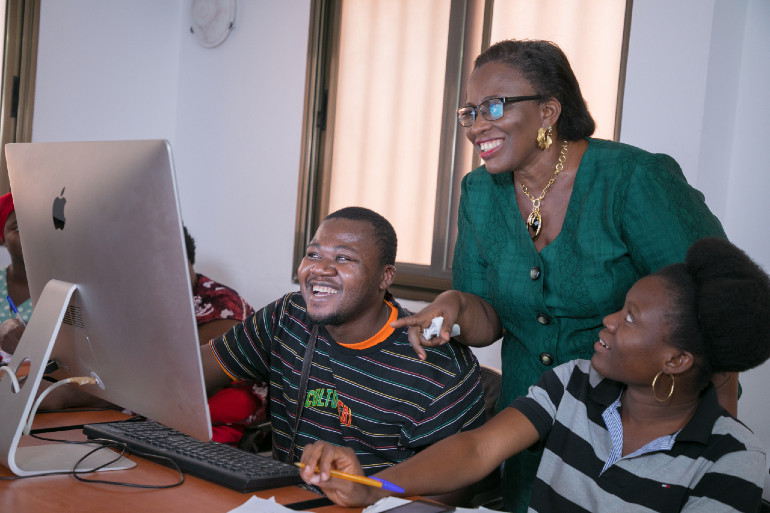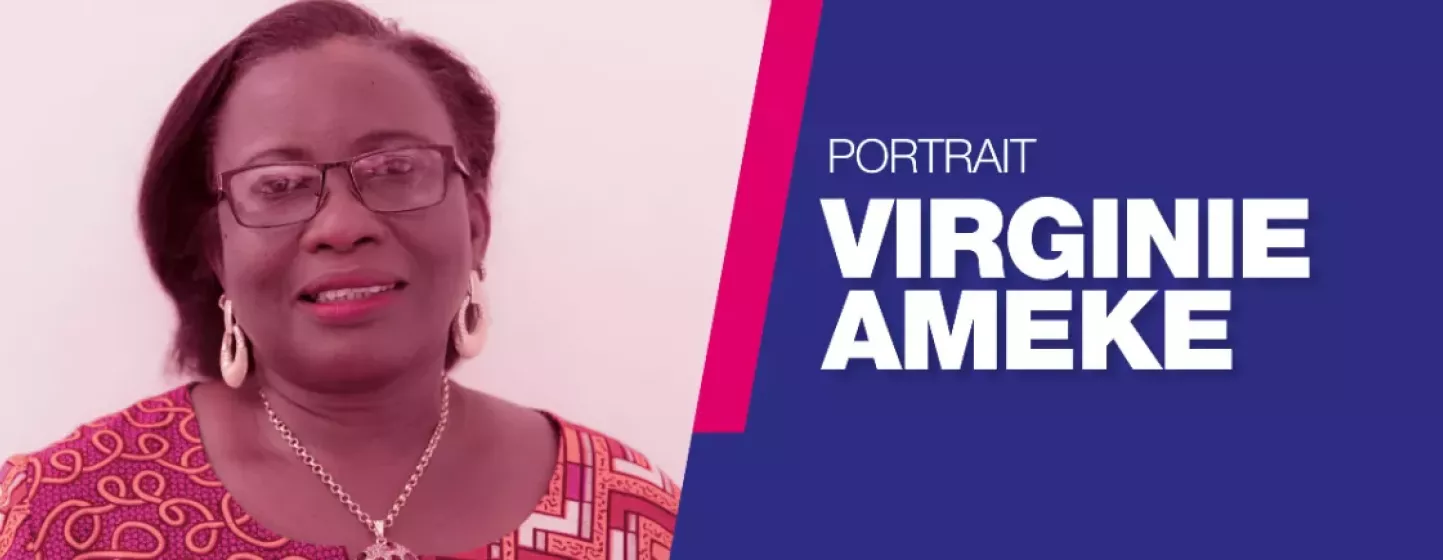Virginie Améké, a strict yet caring mother figure for journalists
Virginie Améké, 60, is the Director of the Centre for Training and Retraining in Communication (CFRC) in Togo. Although she takes care of her team and trained journalists, she can also show a demanding side.
Profiled by Emmanuel de Solère Stintzy.
“It’s a real pleasure to talk to you!” Our interview begins with a welcoming, almost motherly, compliment for a stranger followed by a spontaneous burst of laughter not dissimilar to that of a child. When she was a child, Virginie Améké, the current Director of the Centre for Training and Retraining in Communication (CFRC) in Togo, read books as a way to travel to new places: “I had never really considered journalism. But I was enamoured with reading, to find out what was going on elsewhere.”
Specialising in documentary policy on a degree course equivalent to a Master’s, her formal education as a director would then enable her to travel for real and receive training in France, among other places. However, Togo was where Virginie chose to put her knowledge to good use. Having been appointed to the Directorate of Financial and Administrative Affairs of the Culture Department at the Ministry of Culture in 2011, she went on to become the Director of the CFRC in 2014. The strict manager pulls no punches and begins by explaining the situation back then: “Some called themselves journalists, even though they had no training – just a few years at university... They had failed in that pursuit and so decided to roll their sleeves up... There was work to do!”
“Like a family”
If you think Virginie Améké, at 60 years of age and with her qualifications and impressive career in senior management, has any contempt for the “little” journalists, you couldn’t be more wrong! “Thanks to CFI and its Togo Media project, I might have learned more about journalism than anybody else since 2018! I really had to work hard to reach the same level as the journalists!” Journalist and trainer Sophie Ekoué can vouch for that. “During the train-the-trainer sessions, Virginie took copious notes, filling out many notebooks every day. Now, she no longer accepts any old project to train “high-ranking journalists”. She insists that a project be well set out, with precise outcomes and objectives.”
She might be a stickler, but Virginie Améké is also caring. Sophie Ekoué points out that “everyone calls her “Mum”! She even serves breakfast to those taking part in the training sessions!” After taking off her mask, the cheerful Virginie starts to chuckle again: “There are two sides to me – a stern, imposing director, and a maternal figure. I like to instil confidence in people in order to help them give their best and achieve what I expect of them.”
Does that make her own daughter, Mirinda-Marc Port, née Améké, jealous? Not really: “Mum considers her colleagues to be like a family. Her desire to see those around her develop is in her nature as a leader.”
Just a few months away from retirement, Virginie Améké is pleased with the progress her team has made: “The ten or so members of the CFRC have taken great strides forward in the way they organise training and welcome and follow the journalists undertaking the training as if they were part of our family. We won’t abandon them! And they regularly return to the CFRC. Having gone on to become trainers, some of them tell us that they have been applauded by their students thanks to the training provided!”
As a demanding mother with a large family, Virginie Améké now wants to take care of other “children”, and train technicians and journalists from central Togo.

In 10 years...
A return to her roots, or rather to books and young people. The image of Virginie Améké surrounded by children and books is what several people see when they speculate about what her retirement in a few months will look like. “Even while they are still in the cot, I would like to let Togolese toddlers dabble in books so that they can get a taste for them.” However, after having learned a lot about the media, the CFRC Director isn’t ruling out the possibility of remaining involved with media in some capacity.
“Perhaps by offering programmes on culture and reading, or by writing an informative book about journalism”, she muses. Ever the optimist, she believes that, in the future, Togolese media outlets will be structured more effectively and that journalists with press passes will be better trained. Virginie pauses when returning to talk about herself: “I need a bit of time away and yet the “mum” in me will need to stay active to keep up with the youngsters! I would like to provide one meal a day for street children and make them feel like they haven’t been left behind so that they can realise how valuable they are.”
